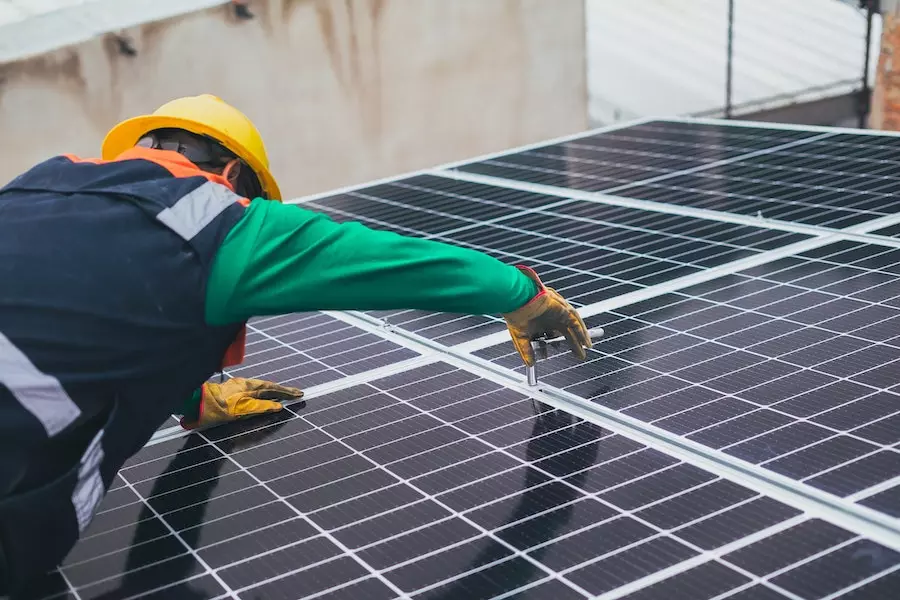
The planet Earth is undergoing degradation and the most visible changes are manifested in climatic features. The uncontrolled use of natural resources and pollution caused by human activities are already adversely affecting people’s health today. You can prevent the impoverishment of the planet by switching to renewable energy sources, such as solar systems, economical consumption of water resources, and making your life greener.
How to lead a sustainable lifestyle, where to start a “green” transformation, and what are the three main ways to turn an ordinary house into an eco-friendly building, you can find below.
What Does An “Environmentally Friendly” House Mean?
The concept of “ecological” indicates a life activity that does not harm the environment. Going green is important in many areas, especially in the field of energy consumption. The popularization of solar energy has not yet reached its maximum scale but has already significantly affected the reduction of man-made impact on nature, given the benefits of solar panels.
In addition to the transition to solar green energy, there are two more eco-friendly houses:
- Economical water consumption;
- Application of energy-efficient technologies for housing improvement.
It is not worth expecting that global changes in the field of economical consumption will give results. The conscience of individuals who become examples in their community brings more value.
Solar Power Is A Big Step Toward Green Energy
More and more citizens who want to switch to solar energy turn to solar companies every year. Batteries are the most effective invention to combat climate change.
Solar panels take the radiation from the sun and turn it into renewable and clean energy. Although the production of photovoltaic silicon cells has not yet completely avoided pollution by production goods, their impact is minimal.
To create an environmentally friendly home, you should give priority to solar systems. The advantages of installing a photovoltaic structure for solar energy are the following:
- Safety of the system for the environment;
- Accessibility of the unit for installation wherever there is access to sunlight;
- No carbon footprint;
- Simple and inexpensive maintenance;
- The emergence of energy independence;
- Lower electricity bills;
- Quiet operation, which allows mounting solar structures on private houses and apartments.
The main advantage of the panels is the generation of clean energy without harmful emissions into the atmosphere, unlike natural gas and coal. The popular slogan “make your home greener” also has an economic justification. Eco-households with alternative power sources significantly exceed the cost of similar properties powered by the grid.
Solar panels reduce or eliminate a home’s consumption from the grid and the ability to sell the excess energy produced by the panels benefits the owner. The relevance of solar systems is especially important in remote regions where there is no connection to public utilities or there are frequent power outages, with eco-tourism.
Permissible Options For Installing Solar Panels
Green home ideas can be promoted in both urban and rural areas. The main target audience for the arrangement of solar stations is private households. Owners are more environmentally conscious about energy consumption.
Renewable energy sources are also suitable for enterprises, especially agricultural ones. For them, it is a stable source of electricity while taking care of the environment.
The development of technologies and the modernization of solar equipment allow the installation of solar modules in apartment buildings. There are three mounting options.
- On the roof of the building. The panels do not affect the landscape of the building and do not take up much space. The problem during installation is only in obtaining permits from the city authorities or the owner of the house.
- In specially designated places on the ground. Installing ground-based solar structures is easier, you can place a system of greater power. Cons in the not-so-attractive appearance of the building and the surrounding landscape.
- On the windows in the apartment. This option loses to the previous methods. Window panels are inefficient at producing watt-hours of energy and cannot cover the electricity needs of all the apartment’s power systems.
The technology of generating electricity from the sun is expanding the audience of conscious citizens who are starting to implement eco-friendly home ideas from a renewable energy source.
How Not To Waste Water
Cleaning products are made with the use of toxic chemicals that end up in water bodies after use. Polluted water harms ecosystems and biodiversity. You can reduce the toxic effect if you use eco-friendly products for homes. They contain natural ingredients without synthetic ingredients. Water should also be in use sparingly, for the necessary needs, and in the right amount. Measures to prevent wasting water at home include:
- Installation of plumbing with special nozzles that reduce water consumption;
- Troubleshooting leaky faucets;
- Setting a timer for taking a shower;
- Turning on dishwashers and washing machines if they are fully loaded.
Conscious use of water resources is an investment in your healthy future.
The Importance Of Energy Efficiency In A “Green” Home
The need for electricity is the main cause of excessive toxic emissions into the environment. To reduce energy consumption, simply installing an alternative energy source is not enough. Modern technologies in the field of energy efficiency provide many options for solving the problem:
- Installation of window energy-saving structures;
- Replacement of light bulbs with energy-saving ones;
- Insulation of the attic and hollow walls;
- Use of electrical engineering with economical energy consumption;
- Installation of smart meters that measure electricity consumption.
If the installation of solar systems is still in the plans, you can connect to the green energy of your utility company.
The list of possible measures to make a house green can include many ways. The main thing is to switch to eco-life now so that the next generations can also use the gifts of the earth.




















